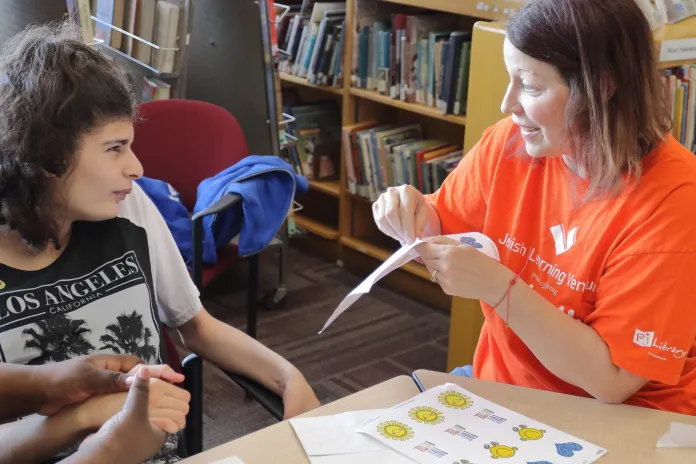When Gabrielle Kaplan-Mayer's eldest son, George, was diagnosed with autism at 3, she realized inclusivity is more than just a welcoming spirit. Now 15 years later, the mom of two and the Co-Interim Executive Director of Jewish Learning Venture (JLV) is a major proponent of creating a more accessible Jewish community.
Through the years, she has come to learn disability inclusion requires understanding specific needs and implementing them into a system not set up for people like her son.
“Before my son was diagnosed, I really didn’t understand what the experience of parents and families who had children with disabilities was like,” said Kaplan-Mayer, who heads JLV’s Whole Community Inclusion initiative that supports families raising Jewish children with disabilities. “That’s really inspired me to make sure that we can make our Jewish community more aware of issues around disability.”
February is national Jewish Disability Awareness and Inclusion Month (JDAIM), which has provided a platform for disability advocates to bring exposure to these issues on a local level.
Each year, JLV’s Whole Community Inclusion and the Jewish Special Needs/Disability Awareness Consortium of Greater Philadelphia plan a month of events focused on disability inclusion.
This February is no exception. However, the month’s programming will be conducted virtually due to the pandemic, a reality which has created its own set of accessibility challenges.
The Jewish Federation of Greater Philadelphia, a member of the Jewish Special Needs/Disability Awareness Consortium, is addressing the pandemic’s impact on the disability population with “Making the World More Accessible in the Time of COVID” on Feb. 15 at noon.
During this virtual event, the Jewish Federation’s Jewish Community Relations Council (JCRC) will have a conversation with Kaplan-Mayer of JLV and Stacy Levitan, executive director of the Judith Creed Horizons for Achieving Independence (JCHAI), a multi-faceted organization that helps young adults with disabilities achieve independence. Kaplan-Mayer and Levitan will discuss their agencies, both of which are supported by the Jewish Federation, and how they have responded to the needs of their communities during the pandemic.
“Our Jewish community is diverse, and there is no ‘one size fits all’ approach to Jewish life. That is why it’s so important to support organizations and communities that are welcoming individuals with disabilities,” said Rachel Berger, the Jewish Federation’s director of Jewish life and learning. “I’m so proud of the organizations that we work with who are making Jewish life accessible, welcoming and joyful for all members of our community.”
Another important aspect of JDAIM is not just its work to raise awareness with community members, but also with congregations and Jewish institutions. JDAIM will have events tailored for clergy, including a training on Feb. 10 at 9:30 a.m. for rabbis and cantors. The workshop will be led by Rabbi Darby Jared Leigh of Congregation Kerem Shalom in Concord, Massachusetts. Leigh is an acclaimed disability rights activist and the second deaf rabbi to serve a hearing congregation.
Local synagogues also have been invited to be a part of “JDAIM Shabbat Across Philadelphia,” where they will dedicate one Shabbat service in February to focus on disability inclusion. Thus far, about 20 synagogues have committed to this call to action.
Regina Levin is one of the speakers that Kaplan-Mayer has connected synagogues with to share her story about being born with a hearing impairment. A congregant and the chairperson of the Inclusion and Special Needs Committee at Temple Sholom in Broomall, Levin has been a leader in advocating for institutionalized changes in Jewish spaces and changing perceptions of invisible disabilities like hers. Ultimately, Levin believes that true inclusion will come when those with disabilities no longer need to ask for accommodations.
“If we have to keep asking for something then we’re not being included,” said Levin, who needs a front row seat at events to read lips. “Just because you’re willing to give me something doesn’t mean you’re being inclusive. Inclusive means that when I or someone else with a disability shows up at a function that our needs are already met.”
While there is still a lot of work that needs to be done to achieve this goal, both Levin and Kaplan-Mayer have noted that the Jewish community has made strides in the last decade.
“What we’re creating through Whole Community Inclusion are things that did not exist when my son was a young child, so this is incredible. It makes me feel like my family is being seen,” reflected Kaplan-Mayer, who thanked the Jewish Federation for a five-year grant that enabled JLV to make sensory-friendly options for their jkidphilly programs.
“Professionally, what I see is there’s so much desire and we’re not having to convince anyone to make these changes. This is an important issue.”
***
For more information about local JDAIM events, please visit:
jewishphilly.org/jdaim.



